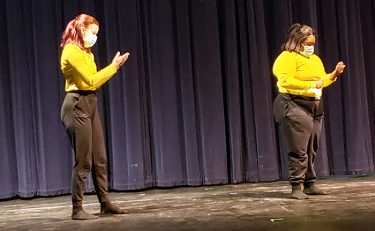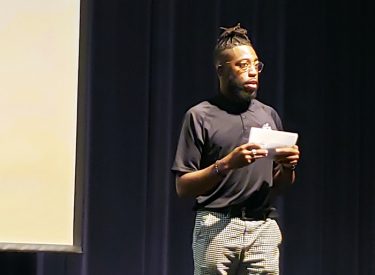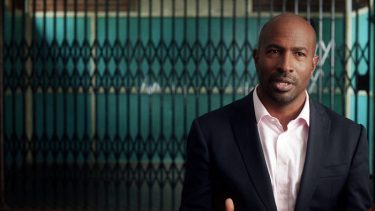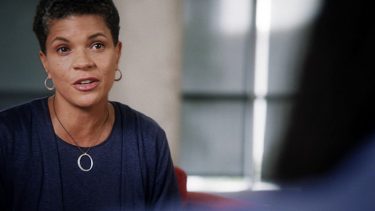
By Lana Sweeten-Shults
GCU News Bureau
“We need more celebration/
More Black representation/
Every human deserves equality/
History has its eyes on us.”

Grand Canyon University freshmen dance majors Victoria Knighten and Kenzie Brandon shared those words with their fellow students at the campus’ final Black History Month program, “Thirteen Steps: Breaking Barriers to Racial Equality,” on Thursday at Ethington Theatre.
They wove the words between their dance moves, as those movements pushed and pulled and expressed this theme: There are always two sides to every story.
The program, a collaboration between the College of Fine Arts and Production and the Multicultural, Diversity and Inclusion Office, featured not only the opening dance but a viewing and discussion of director Ava DuVernay’s Oscar-nominated and Emmy-winning documentary "13th."
The film screening and discussion culminated a series of events that took on a more celebratory approach to Black history and identity. The series also included the “Afrotastic Expose,” a showcase of Black students’ artistic talents at Ethington Theatre, and the Black Excellence Roundtable, which featured guests who lived through racial strife in America.
The documentary deep dives into the 13th Amendment, which abolishes slavery. But within that amendment is an often overlooked clause -- a clause that gives those who would embrace it an “out,” according to the documentary, or a loophole, if you will, to slavery.
According to the 13th Amendment, “Neither slavery nor involuntary servitude, except as a punishment for crime whereof the party shall have been duly convicted, shall exist within the United States, or any place subject to their jurisdiction.”
Except as a punishment for crime ...
From those six little words, DuVernay launches into the premise for the documentary and how America's system of mass incarceration -- called a human rights tragedy in the film -- contributes to systemic racism today. The film tracks historically, over its 100-minute running time, the transition of America’s slave-dependent economy to a criminal-dependent one, in essence, swapping the big business of slavery for the big business of mass incarceration.

Donald Glenn, Director of GCU's Multicultural, Diversity and Inclusion Office, said the theme for the campus’ Black History Month events has been to look back at the history of Blacks in America, survey where they are now and look to the future.
The discussion surrounding “13th” fit that theme.
President Barack Obama’s words, which open the documentary, give the sobering statistics: The United States is home to 5% of the world’s population but 25% of the world’s prisoners.
Another statistic: In 1972, the prison population was 300,000. Today it’s 2.3 million, which means the United States touts the highest rate of incarceration in the world.
“13th” shows images of Black prisoners early in the 20th century, just a few years after the abolishment of slavery, then focuses on the Jim Crow laws, which were designed to keep Blacks from voting, getting an education or holding jobs. Viewers also see newsreels of lynchings, they journey through the civil rights movement in the 1950s and 1960s, and they also learn about policies under presidents Richard Nixon, Ronald Reagan and Bill Clinton that ramped up the “war on crime” and resulted in the exponential increase of incarcerated criminals, particularly those from communities of color.
Students saw clips, too, of D.W. Griffith’s landmark silent film “The Birth of a Nation” (1915) in the documentary. The movie portrays Black men as animalistic and dangerous to White women, and it glorifies the Ku Klux Klan.
Glenn asked how students thought the media in popular culture has contributed to a dangerous climate of White fear in society.
“It’s crazy to think that all the stereotypes are kind of formulated in one piece of media – that movie,” said Grace Kuehne, Multicultural Office Specialist and a recent communication and media studies graduate of GCU. “ … If you only see one thing in the media or have only one experience with a group of people, that’s what you’re going to believe. So since the 'The Birth of a Nation' movie, media has kept up with that idea of what was in the movie.”

Knighten added how we should be cautious about hearing only one side of the story.
“That’s what was kind of the intent of our dance: There’s always two points of view,” she said. “… Recently I’ve viewed the news as it’s designed to scare me. When I watch the news … it’s never, what’s the positive aspect of today’s news?”
Ajienne Lambey, an IT/cybersecurity major minoring in graphic design, agreed that the media highlights negative stories but said that even the positive stories don’t go far enough to spotlight deeper societal issues. However, she has seen a change in society to go beyond the headlines and try to find a solution to those deeper societal issues.
“I know a lot of people are aware of this and are trying to address it," Lambey said. "Like on my social media page … I see more people talking about these types of issues, and they’re speaking up on it.
“I just like the idea of this event because we’re all here and speaking up on the matter and trying to educate ourselves.”
Glenn asked how students might end the cycle, particularly when it comes to policies that have disproportionately put African Americans behind bars: "How can we, as a community of people, and a Christian community of people at that, be an answer where we know that there's a problem?"
For himself, Glenn said, it's standing up and saying something, not just to friends but to those in power: "At least if I do that, I know I have spoken my truth, and the Bible is clear. They shall know the truth and the truth shall what? Set you free. So we have a responsibility to speak truth to power whenever we get the opportunity, because I think that's what's going to allow change."
“I think a good step is to stop criminalizing people who have addictions,” Kuehne said. “… I don’t know how someone who’s addicted, how putting them in jail is supposed to help them at all. If they’re addicted, they should go through programs to get over their addiction.”
Kelsia Liburd, a hospitality and marketing senior, spoke about how "education can be a more powerful tool than locking someone up."
Glenn then asked if students might make any personal changes after watching “13th.”
Several said they wanted to stay informed, stay educated and put pressure on the people empowered to make the changes, meaning the politicians we elect.
“You can call your senator. You can call your representative,” Glenn said. “Say, ‘Hey, these are my thoughts.' … You elected them for that reason. When you’re electing somebody, research these people and know what they’re supporting and know what they’re contributing.

“That’s important. … That’s how we can speak truth to power.”
Liburd said the personal change she wants to make is to stop accepting offensive racial behavior.
“You have to call them out on it – hold them accountable,” she said. “… So that’s one of the biggest changes – not brushing it off and be like, ‘Oh, they can’t help it.' Yes, they can. Yes, they can. So stop accepting.”
Knighten said that she, too, doesn’t want to be that person to let those kinds of behaviors slide. She added that it’s OK if people don't know her point of view.
“I can’t be mad at them for not knowing,” she said. “ … It’s a good thing for me, because now I’m able to educate this person, ‘Hey! This is what’s going on. Here’s another point of view.’”
Travon Schake, who was visiting campus, said he also wants to make sure to continue the conversation. He said when everyone posted the black square on social media for Blackout Tuesday in support of Black Lives Matter, he asked, “And then what?”
“Again, it’s keeping our foot on the gas and keeping going. Next month will bring something new on Instagram.”
Daniel Hernandez, a freshman majoring in entrepreneurial studies, agreed: “We have to continue the noise. … If we allow ourselves to stay in that position where we are not being heard, we’re allowing ourselves to be suppressed because we feel we’re going to be suppressed anyway.”
He likened equity and justice to reaching for the fruit on an apple tree. Even if you have a 6-foot ladder, you won’t reach the apples if the tree is tilted: “Make it stand upright so everybody can have fruit from the tree.”
While Black History Month events wrapped up on Thursday, the Multicultural Office is already getting ready for its next event, Culture Fest, which will run from 4-6 p.m. Thursday on Juniper Field. Like Black History Month events, it, too, will be a celebration of culture.
Senior writer Lana Sweeten-Shults can be reached at [email protected] or at 602-639-7908.
***
Related content:
GCU Magazine: GCU’s Multicultural Office opens window to diversity
GCU Magazine: Flag unfurled on multiculturalism at Un1ty One event



































































